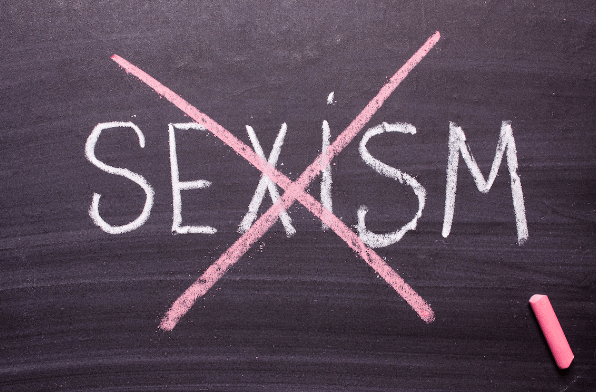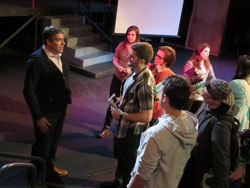In honor of Women’s History Month, the affiliated faculty of the Program in Gender and Intersectionality Studies (PGIS) weighed in on the pervasiveness of sexism within the academe, which refers to the academic world in which professors and students study, as well as Monmouth University. They emphasized that even in the 21st Century, sexism still prevails in the workplace— academia is no exception.
More specifically, faculty cited pay inequality as one of the most pressing issues.
“At Monmouth University, we have documentation that female professors are paid, on average, less than male professors; this is a trend that reflects broadly of other schools and the marketplace beyond Monmouth,” began Jennifer McGovern, Ph.D., Associate Professor for the Department of Political Science and Sociology, Faculty Athletics Representative, and Sociology Program Director.
This reality is, in part, a consequence of what society perceives as “feminine” work.
McGovern expanded, “Generally, jobs that women do tend to be undervalued compared to jobs that men do, which relates more to the qualities of the job than who is doing the job. For example, feminized occupations, like nursing and social work, often involve caring for others… Those professions are undervalued and make less money than, say, accounting and law—careers that reward rationality and discipline; conversely, those qualities are typically associated with men.”
“The fields taking on the biggest burdens– to care for our fellow humans– are often the ones with the worst compensation, benefits, etc.,” said Kiameesha Evans, Dr.PH, MPH, MCHES, Interim Director of PGIS and Specialist Professor for the Department of Health and Physical Education.
According to McGovern, this measure of value translates to professors’ pay— for instance, accounting professors are paid more than the social work and nursing professors. A salary study conducted by Monmouth faculty in 2021 uncovered these pay inequalities.
“The faculty union [Faculty Association of Monmouth University, FAMCO] learned that faculty who taught in majors associated with so-called ‘masculine traits,’ such as accounting and finance, were paid on average $20,000 more at Monmouth than faculty who worked in departments associated with ‘women’s work,’ like social work, health studies, nursing, and special education. In fact, the study found that in some cases faculty in masculinized departments at MU were paid almost twice as much as their colleagues in feminized departments,” underscored Johanna Foster, Ph.D., Associate Professor for the Department of Political Science and Sociology, Director of the Sociology Program, and President of FAMCO.
“People defend this by saying things like, ‘Well, these male-dominated jobs are just harder, but, simply, they require a different set of skills and society values those skills differently; thus, those values are reflected in the professorship,” continued McGovern.
“For me, the care work disparities across academia based on gender and sex are troubling. Our cultural expectations and norms continue to place an unequitable burden on scholars and educators who identify as women to care for others emotionally and materially,” said Claude Taylor, Lecturer in Communication Studies and Director for Academic Transition and Inclusion.
Katherine Parkin, Ph.D., Professor for the Department of History and Anthropology and Jules Plangere, Jr., Endowed Chair in American Social History, expanded on other disparities beyond pay, “The way it plays out has varied, but pay disparities, the types of positions held (e.g., tenure track), and student evaluations are all ways that we see women treated differently than men in academia.”
Foster affirmed, “There are other indicators of the persistence of sexism in academia nationwide, such as gender disparities in rank and promotion, limited access to robust parental leave and childcare benefits, as well as the realities of sexual and gender-based harassment in the workplace, which, like the entrenched gender salary gaps across the nation, are simply inexcusable. We know Monmouth has been looking closely at these issues and should continue to do so.”
Citing from personal experience, Parkin elaborated, “I’m experiencing sexist discrimination right now in my job. I hold an endowed chair and my predecessor, a man, taught less. When I took the position, they increased my teaching load from what his had been; I’m expected to teach more for the same position than a man did. Instead of a pay increase or a course reduction, I received a worse position.”
“Academia is one of the bastions of sexism; it is reflected not only in the pay inequity between women and men, but also in terms of professional advancement,” added Marina Vujnovic, Ph.D., APR, Professor for the Department of Communication and Director of Strategic Public Relations and Social Media Concentration. “Research has shown that women, in particular women of color, are often overlooked for promotion to senior positions of leadership, even in the academic fields that are dominated by women, such as humanities. Institutional sexism is also reflected in who gets denied tenure and promotion.”
She reflected, “I have had female colleagues in academia who were passed up for awards that they clearly deserved, and especially passed up when it comes to leadership positions. It is also important to note that sometimes sexism exists in the classroom. In the past, I have experience of being bullied by male students. In one such instance, the student was issued a restraining order for his aggressive behavior. I know that my female colleagues have shared with me other instances in which male students feel empowered to challenge female professors in a way that they would not challenge male professors.”
PGIS also weighed in on the intersectionality of race and gender in academe. Per the program’s mission statement, “[The PGIS] supports the rigorous examination of the social construction of gender in various cultural and historical contexts and encourages students to become keen analysists of how gender inequalities, in a range of domains, intersect with other structures of advantage and disadvantage, such as race, class, nation, and sexuality.”
Speaking on this intersection, Evans explained, “I recognize that I sit in an intersectional space both as an African American person and woman simultaneously.”
Lisa Dinella, Ph.D., Professor for the Department of Psychology and Principal Investigator of the Gender Development Laboratory, said, “We see how sexism and racism are interlocking systems of oppression, as evidenced by the abysmally low rates of Black and Latina/Hispanic women faculty members employed here at Monmouth University.”
Dinella likewise explained how motherhood can further disadvantage women in academia.
When Deanna Shoemaker, Ph.D., Associate Professor for the Department of Communication and Graduate Director for Master’s in Communication, pursued research on work-family-life balance as a new mother on the tenure-track in the academe, she was told it would negatively impact her career.
“I have been elected as the next Chair of the Department of Communication, and I will be the first woman ever elected to this leadership position in my large and longstanding department,” stated Shoemaker.
Parkin advised, “I think the way to change the conversation is for everyone to commit to a belief in equality and act accordingly.”




